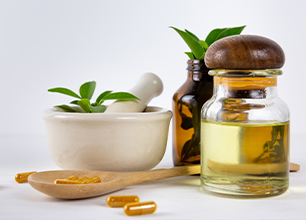Your Comprehensive Guide to Hypertensive Retinopathy
Hypertensive retinopathy is a medical condition characterized by damage to the blood vessels in the retina due to high blood pressure. Prolonged and uncontrolled hypertension can lead to changes in the retina's small blood vessels, causing them to narrow, leak, or become blocked. This can impair blood flow to the retina and cause Hypertensive Retinopathy. There are a lot of treatment methods available for hypertensive retinopathy in Ayurveda. Regular eye examinations are essential for early detection and management of hypertensive retinopathy to prevent further damage to the retina and preserve vision. In addition, controlling blood pressure through lifestyle modifications and Ayurvedic medications is crucial in managing this condition.
Get Hypertensive Retinopathy
Book your
Appointment
Call Us
Mail Us
Book an appointment
Symptoms of Hypertensive Retinopathy
Visual changes
Retinal hemorrhages
Cotton-wool spots
Optic disk changes
Data & Statistics For hypertensive retinopathy treatment From Research Studies
Hypertensive retinopathy has a higher prevalence in individuals of African, American and Chinese descent. Furthermore, the incidence of high blood pressure tends to increase with age. Men are more commonly affected than women in age groups below 45 years old, while women are more affected in age groups above 65 years old. Hypertensive retinopathy treatment in Ayurveda involves various herbs, therapies and lifestyle changes, that makes it easier to manage the symptoms as well as provide overall improvement in eye health.

Correct Hypertensive Retinopathy without surgery

100% natural medications

Safe & advanced technology

Proven results against Hypertensive Retinopathy
Story of Health & Healing
Hear Experiences of Happy Patients at
Dr Basu Eye Hospital
Ayurvedic treatment of every eye problem
Best Ayurvedic Eye Hospital in Delhi India
Our Doctors
Through experience and keen observation of different eye cases, Dr M S Basu studied the effectiveness of herbal treatments. After 9 years of intensive research, Isotine was developed and launched. The flagship invention of Dr. MS Basu shot to instant fame and success. It is the basis of all treatments at our hospital, combined with an array of holistic practices.
As the CEO, and a qualified optometrist, Dr. Mandeep Basu understands the dynamics of eye care in the contemporary lifestyle. He ardently looks after the research and development team and guides them on innovations and product development initiatives.
Frequently Asked Questions
Hypertensive retinopathy arises due to elevated blood pressure levels, known as hypertension. Hypertension occurs when the force exerted by blood against artery walls is consistently high, leading to the stretching, narrowing, and damage of arteries over time.
The condition specifically affects the blood vessels that supply blood to the retina at the back of the eye. The risk of retinal damage increases with the severity and duration of high blood pressure.
Older individuals are more susceptible to developing high blood pressure and, consequently, hypertensive retinopathy.
Additional factors that can contribute to the likelihood of developing hypertension include:
- Being overweight
- Leading a sedentary lifestyle
- Consuming a high-sodium diet
- Experiencing high levels of stress
- Having a family history of hypertension
- Having diabetes
- Engaging in moderate to heavy alcohol consumption.
Stages of hypertensive retinopathy:
Hypertensive retinopathy is categorized into four stages:
Grade 1: Mild hypertensive retinopathy characterized by slight narrowing of the arteries and elevated blood pressure. Typically, no noticeable symptoms are present at this stage.
Grade 2: Hypertensive retinopathy progresses with more prominent narrowing of the arteries and higher blood pressure levels. Symptoms are generally absent during this stage.
Grade 3: Upon examination, retinal damage becomes evident, including signs such as retinal haemorrhage (bleeding) and the presence of cotton wool spots—white patches on the retina. Symptoms may start to manifest at this stage.
Grade 4: Severe hypertensive retinopathy that includes the characteristics of Grade 3, along with swelling of the optic disc (papilledema). Symptoms are usually present, indicating a more advanced stage of the condition.
These stages help Ayurvedic doctors from the best Ayurveda eye hospital to evaluate and monitor the progression of hypertensive retinopathy, allowing for appropriate management and treatment decisions. Regular eye examinations are crucial for early detection and intervention.
Ayurvedic treatment for hypertensive retinopathy offers several benefits. Ayurveda focuses on restoring balance in the body, aiming to address the root cause of the condition. Herbal formulations prescribed in Ayurveda can help improve vascular health, reduce inflammation, and strengthen the blood vessels in the retina. Ayurvedic therapies, such as Netra Tarpana (eye nourishment) and Nasya (nasal administration), provide targeted care to the eyes and promote ocular health. Ayurvedic therapy is also an excellent ayurvedic treatment for CRVO and other eye disorders like Myopia, diabetic retinopathy, and more. Dietary recommendations and lifestyle modifications in Ayurveda emphasize a healthy, balanced diet, stress reduction, and physical activity, which contribute to overall well-being. Ayurvedic treatment for hypertensive retinopathy provides a holistic approach, supporting the body’s natural healing processes and potentially improving visual outcomes.
Some Ayurvedic herbs used for hypertensive retinopathy treatment include:
Triphala
Ginkgo Biloba
Bilberry
Saffron
Amla (Indian Gooseberry)
Punarnava
Ashwagandha
Brahmi (Bacopa monnieri)
Haritaki
Gotu Kola
Palash
Be it treatment of Hypertensive retinopathy, Ayurvedic Treatment for amblyopia or any other eye disorder, we always suggest everyone to connect with an experienced Ayurvedic doctor and know the right dosage and right treatment methodology required for them.

